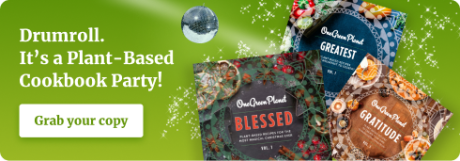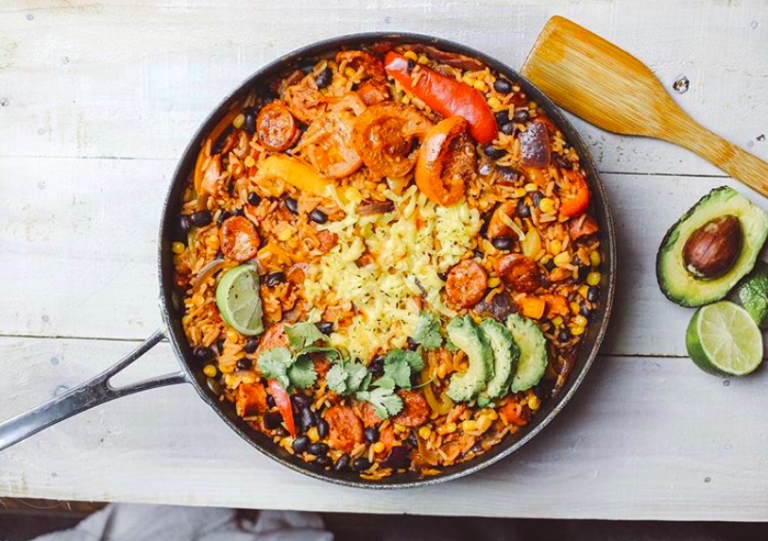Whole Food Plant Based Diet Digestion


For the most part, a plant-based diet is a great way to enhance your digestive system since it's rich in fiber, water, vitamins, minerals and lacking in hard-to-digest foods such as red meat, dairy, and eggs. However, there are some people like myself who have digestive difficulties and might find a plant-based diet challenging at first. We'd like to assure you that there are some simple ways to deal with digestive difficulties such as low stomach acid, indigestion, IBS, and general bloating that make things easier.
Remember that everyone is different and the best way to find the foods that work well for you is to test the waters out yourself. While one food may trigger problems for you, someone else with digestive struggles may tolerate it fine. When I started eating a plant-based diet, I plunged in with excitement and learned a few tips for helping my digestion in the process.
We also highly recommend downloading theFood Monster App — with over 15,000 delicious recipes it is the largest meatless, vegan, plant-based and allergy-friendly recipe resource to help you get healthy!
Here are some tips I've learned that you can experience and enjoy for yourself too:

Shutterstock
1. Start With the Basics
While there are amazing and fun vegan products on the market that replace animal products such as cheese, ice cream, milk, and meat – the truth is that these processed versions can be taxing to the digestive system at first unless you're used to eating them. Many are often filled with certain fillers, gums, and stabilizers that many people find are hard to digest. Instead of consuming vegan processed foods, just start with the basics and go for more greens, fruits, veggies, easy-to-digest grains (such as quinoa, millet, gluten-free oats, amaranth, and rice) over gluten-containing grains like wheat barley and rye. If you're a fan of vegan protein powders like myself, always opt for one that's free of additives, sugar, and gluten for optimal digestion as well.

Beet and Walnut Dip
2. Eat Legumes With Ease and Caution
Legumes such as chickpeas, lentils, peas, and beans such as black beans, kidney beans, and soybeans are all great for you, but your tummy might need some extra help from you when you first start eating them. Be sure to cook your beans very well and consider eating them in pureed forms at first like delicious hummus (made of chickpeas or edamame), pea soup, or a veggie burger instead of eating them whole over salads or alone. This can help improve how you digest them and might help your body adjust to consuming them a bit better.
3. Increase Your Leafy Greens
Leafy greens are incredibly healing to the digestive system since they promote gentle cleansing and help lower inflammation. I find that green smoothies are a delicious, easy way to get in on the benefits and one of the easiest to fit into my day. Try out some of my delicious tips to make your green smoothie taste better and learn the best way to make a superfood smoothie your body will love.
4. Take it Easy on the Raw Veggies
While corn, carrots, broccoli, and cauliflower are all awesome for you, they're sometimes hard to digest in raw form. When you go plant-based, ease your way into eating raw vegetables. Most people find they tolerate raw greens and fruits fine, but find veggies are much better tolerated when cooked first. The cooking process helps the body gets used to breaking them down. If you're concerned about nutrients being lost, consider steaming or baking your veggies instead of boiling them where vitamins leach out into the water.
5. Consider Digestive Enzymes
Digestive enzymes are safe supplements that you can take which help break down your food easier. Most people find their digestion is much better with the use of certain enzymes. Just remember to buy plant-based versions, not ones that use animal ingredients. You can also eat pineapple and papaya, which both contain certain digestive enzymes that help ease the stomach and promote easier digestion of protein and fat.
6. Choose Raw Nut Butter Over Roasted
I love almond and cashew butter but find roasted versions sit pretty heavy in my stomach and lead to pain quickly. Raw nut butter is much easier to digest since they still contain live enzymes that help the digestive process. They also contain less oil, salt, and acidity than roasted versions. Also, be wary of peanut butter if you have a sensitive digestive system. Peanuts can be hard for many people to digest and are often contaminated with mold that might upset a healthy gut bacteria balance.
6. Embrace Root Veggies
Root veggies like sweet potato, beets, onions, winter squash, carrots, red potatoes, and even white potatoes are amazing for your digestion. I love baking them or roasting them for an incredible flavor that is also easy on the stomach. Root vegetables are high in water and soluble fiber which help improve regularity and constipation. They also contain a large amount of potassium and magnesium, which help prevent bloating and constipation. You can eat these over a salad or with dinner, or check out some other amazing ways to use them too.
7. Embrace Herbal Tea
Herbal teas like peppermint, chamomile, ginger, fennel, anise, and rooibos (a sweet red tea) all help the digestive process and are especially awesome if you have IBS symptoms. Consider having them thirty minutes after mealtime or before bed to help relax and settle your stomach.
8. Watch the Oils
Oils can be incredibly dense on the stomach and aren't a whole food. They can also trigger diarrhea or stomach pain. I advise eliminating oils and embracing whole foods that contain beneficial fats instead such as flax, chia, olives, coconut, and avocado. You can also cook without oil by using lemon juice, balsamic vinegar, or just plain water if you like. For salad dressings, opt for avocados, hemp seeds, lemon juice and/or balsamic vinegar. Check out these 10 Ways to Make Amazing Salad Dressings.
9. Soak Your Grains First
If you love grains like oatmeal and buckwheat, consider soaking them overnight before cooking them the next day. Just place them in the fridge covered in some water and rinse the next morning before cooking them. You can also enjoy overnight oats if you like too. Soaking the grains first releases phytic acid from them, which some people find hard to digest. Health aside, it also helps them cook quicker too.
10. Don't Overdo the Fat
Fat is a necessary ingredient for each of us and offers health benefits we needn't ignore. However, eating more fat than your body can digest at each meal can tax your system and slow down digestion. While specific amounts will vary for everyone, it's usually best to view fat as a small topping such as a tablespoon of flax or chia meal over a smoothie, or 1/4 an avocado on a salad.
Check out these Warm Foods and Drinks That Benefit Digestion, and make sure to read Improve Your Digestive Health in Just One Week With These Eating Tips! Also,Combating Constipation and Improving Your Internal Digestive Rhythm with a Plant-Based Diet.
Whatever you do, don't give up on a plant-based diet when it comes to digestion. There are helpful ways to get around digestive struggles, and it just takes some tweaking to find what works for you. Some people also find they tolerate fruit alone or on an empty stomach while others find they tolerate it fine with meals. Experiment with all the delicious foods a plant-based diet has to offer and you'll find your happy" digestive place" in no time!
Learn How to Cook Plant-Based Meals at Home!

Reducing your meat intake and eating more plant-based foods is known to help with chronic inflammation, heart health, mental wellbeing, fitness goals, nutritional needs, allergies, gut health and more! Dairy consumption also has been linked many health problems, including acne, hormonal imbalance, cancer, prostate cancer and has many side effects.
For those of you interested in eating more plant-based, we highly recommend downloading the Food Monster App — with over 15,000 delicious recipes it is the largest plant-based recipe resource to help reduce your environmental footprint, save animals and get healthy! And, while you are at it, we encourage you to also learn about the environmental and health benefits of a plant-based diet.
Here are some great resources to get you started:
- Weekly Vegan Meal Plans
- Plant-Based Health Resources
- Plant-Based Food & Recipes
- Plant-Based Nutrition Resources
- The Ultimate Guide to Plant-Based Nutrition
- Budget-Friendly Plant-Based Recipes
- High Protein Plant-Based Recipes
- Plant-Based Meal Prep
For more Animal, Earth, Life, Vegan Food, Health, and Recipe content published daily, subscribe to the One Green Planet Newsletter! Lastly, being publicly-funded gives us a greater chance to continue providing you with high quality content. Please consider supporting us by donating!
Whole Food Plant Based Diet Digestion
Source: https://www.onegreenplanet.org/natural-health/how-to-deal-with-digestive-difficulties-on-a-plant-based-diet/